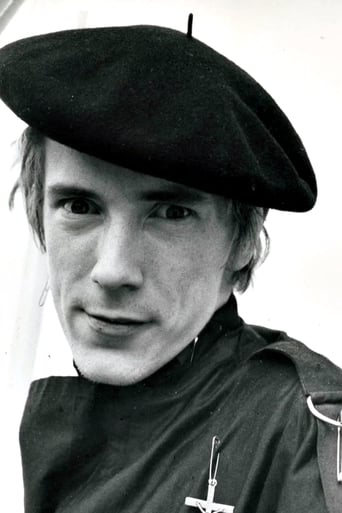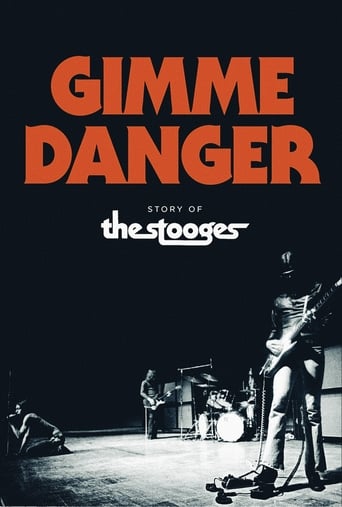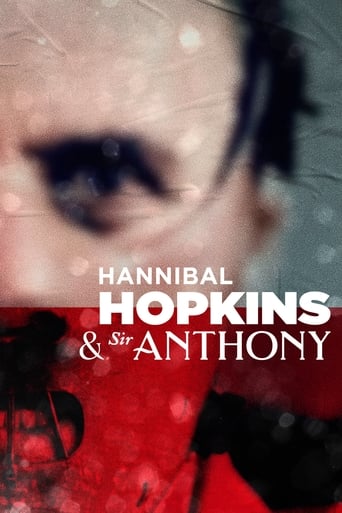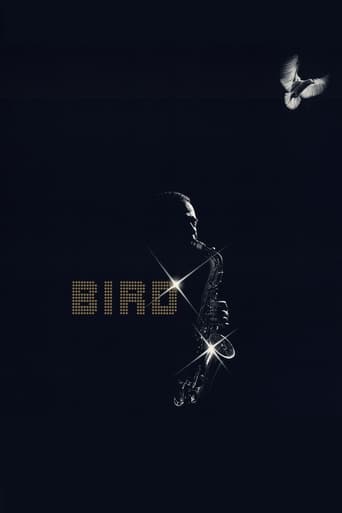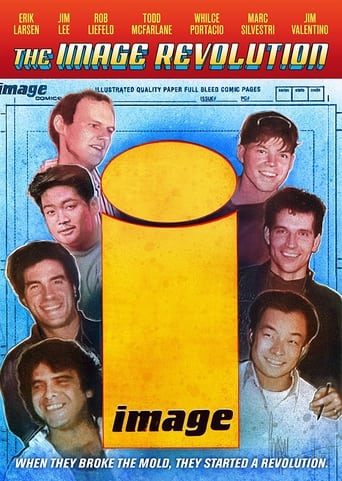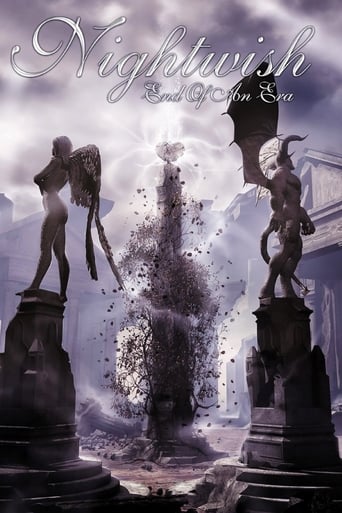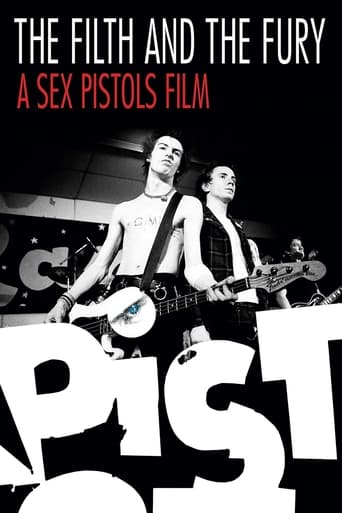

The Filth and the Fury (2000)
Julien Temple's second documentary profiling punk rock pioneers the Sex Pistols is an enlightening, entertaining trip back to a time when the punk movement was just discovering itself. Featuring archival footage, never-before-seen performances, rehearsals, and recording sessions as well as interviews with group members who lived to tell the tale--including the one and only John Lydon (aka Johnny Rotten).
Watch Trailer
Cast
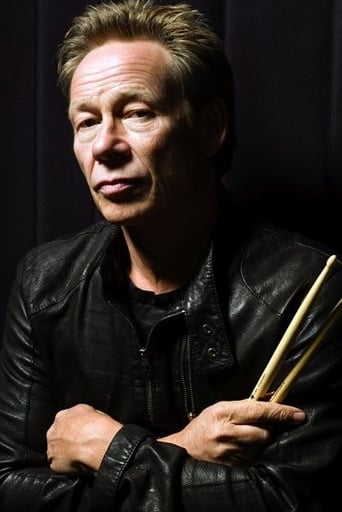


Similar titles
Reviews
This is the Sex Pistols in their own four-letter words, probably a better way to review punk rock than in Malcolm McLaren's self-regarding version of the story, filmed by the same director twenty years earlier.It is hard to know who could be shocked by this outpouring of meaningless blasphemy and violent rebellion against nothing very much. Yet many people were deeply outraged by the first of the punk rockers. A Welsh town tried to ban them. The giant record company EMI felt obliged to fire them. And the veteran TV presenter Bill Grundy wrecked his career by failing to restrain their foul language on a chat-show.All of this was music to the ears of McLaren, who had been casting around for a new brand of youth-protest to replace the fading hippie culture in which he himself had been so immersed a few years earlier. Something harsher was needed, something with spikes and swastikas, laced with heroin.The answer was Punk, perhaps the most effective four-letter word of them all, literally impossible to utter without anger and hate. The band itself is awash with hate, and self-hate, at its most unmistakable in the Sid Vicious interview, where he says he wishes he was underground. (A few months later, he was.) Julien Temple's treatment has been praised for its subtle interleaving of newsreel to provide the social background that was supposed to justify the excesses of Punk. Personally, I can't see what's so subtle about it, though the apparently irrelevant clips from Olivier's Richard III may be putting out a message too subtle for most of us.Still, the authorised (socialist) version of 70's England is the main theme - an oppressed working class, ripe for revolution. Johnny Rotten probably didn't realize he was revealing the flaw in the argument when he says "We don't know who 'working class' means any more." Indeed not. It used to mean manual workers and their families. By the 70's, it had swung round to mean almost everything other than this - a rentamob of full-time anarchists, unemployables, illegal immigrants and striking students and professors. (Johnny and Sid first met in higher education.) In the end, the sheer nihilism of the subject makes it monotonous, and it doesn't help that all four of the band are actually named John, so we often don't know who is describing whom. Like all revolutionaries, they disagree about everything, except their intense loathing for Sid's girlfriend Nancy Spungen. ("Never felt such negative energy"). Still, there is a nice touch, arriving at JFK, where the customs are determined to do a full drug-search... until they take a look at Sid's underwear, and mysteriously decide to wave them through after all.
The Filth and the Fury is directed by Julien Temple and is a rockumentary charting the rise and fall of Punk Rock flag bearers, The Sex Pistols. 20 years earlier Temple had made The Great Rock and Roll Swindle, a bonkers and quirky movie that skewed the Sex Pistols legend as some elaborate hoax formulated by band manager Malcolm McLaren. The Filth and the Fury tells the story from the viewpoint of the band members themselves and goes some way to dispelling the myths that surround them and their self publicising manager. The title of the film is a reference to a headline that appeared in the British tabloid newspaper The Daily Mirror after an interview with the band on ITV's Today show presented by Bill Grundy. The story follows the band members from their humble beginnings in London's Shepherd's Bush, to their implosion at the Winterland Ballroom in San Francisco, and then to coup de grace as Sid Vicious & Nancy Spungen left the mortal coil.Love them or hate them, The Sex Pistols in the mid to late 70s created a wave in the music industry that can still be felt today. Most of it now seems tame of course, swearing on TV and alleged distasteful songs are common practice these days, but it were not the case back when flared trousers and guys wearing make up gave way to Punk Rock Britannia. But is there anything here for those who just don't get that the Pistols were influential and one of Britain's most important bands? Yes, definitely. This is no rose tinted glasses documentary serving only to keep the Pistols name on the high heat. Nor, is it over an hour and half of their videos and live footage. Of course the music features prominently, but it's in context to the story, a story that sees the remaining band members give frank and honest assessments of the time, the place and the now.Interviewing the band singularly in darkened silhouette to give off the impression we are witnessing criminal informers at work, Temple also puts the band into historical context with Britain's social situation in the 1970s. This is crucial to the origins of the band. It was a time of strikes and suspect politicians, so with archival footage from the period, Temple fuses the Pistols ire with that of a country that was limping along in apathy. Haters of the band don't want to agree of course, but the Pistols showed that not all of Britain would surrender meekly, and, that music could actually make a difference and shake up the system. "Get Off Your Arse" snarled John, and thousands did, as Punk bands formed over night and showed that the youth of the day had a voice. How many bands can say that eh?But as we know, it was to be a short lived journey for the band, one that would end in tragedy: as first the press went bazooka over the top with their every move, and then as one out of his depth bass player lost sight of the bands vision. This part of the film is subtly handled by Temple, the sense of impending doom hangs heavy, none more so with the old interviews held with Vicious that are woven into the last third as self destruction grows ever near. These sequences show what many people either forget or don't realise; that Vicious was just a kid of 21 years of age. This part of the tale also lets us into an untapped part of Lydon's {ne:Rotten} emotional side, a telling moment that brings the sorry chapter to a close.From a time when music could be as dangerous as the politicians running the country, The Filth & The Fury is an essential music based movie. Not just for fans of the band, nor just for curious music fans in general, but also for historians wishing to see just how bad late 1970s Britain was. 10/10
The real story of punk rock will, apparently, never be told. I suppose that's because most of the surviving participants have too much ego invested; or because, as the years fade, and the original social context disappears, the meaning of Punk - at its inception - becomes harder to decipher and easier to forget.I was in NYC in '76, when it was first breaking for the national press, and I hung around CBGBs under a number of pseudonyms, trying to write reviews and articles on bands that nobody ever heard of, many of them breaking up before I could dot the last "i" in the last paragraph. And I tried out a couple bands of my own, weird blends of Iggy and the Velvet Underground. But I was really an outsider (coming from upstate); and when the London scene started shipping singles over, I knew that, for whatever reason, my heart was really more into "Anarchy" and "White Riot" than the metal-surf-music of the Ramones or early Blondie. But this disjunction of 'right time wrong place' or whatever, allowed me to see the development of Punk in a way others seem content to ignore.The fundamental problem that Punk never resolved (and current neo-punks are still struggling with it), is, whether Punk was to be a continuance of the "counter culture" of the '60s in different guise, or just another pop-music for sexually frustrated young people. This sounds like an empty theoretical issue, but it has one all-important concrete aspect to it no one can ignore - money. Did (do) punks make music to make music - or to make money? That question was never answered; or, perhaps, every punk answered (answers) it in his/ her own way. Yet once we begin adding up all the individual answers, most of them sure come out sounding like "money". Yet the memory of Punk survives largely because it seemed to be about anything other than money; so the dilemma continues.That dilemma surfaces again in this film, especially in the discovery of the wretched rip-off Pistols manager Malcom McLaren pulled, not only on the audience, but on the Pistols themselves. The brief moments from the (thankfully unfinished) "Who Shot Bambi?" make it very clear that McLaren had not the slightest clue as to who the Pistols were, or what they represented. Yet he not only continued to guide their career after their break-up, but is warmly mentioned in Griel Marcus' scholarly history of Punk, "Lipstick Traces", which will probably bear influence on punk histories, long after the last "photo-album" paperback turns to dust. Yet it is clear that from the get-go McLaren's only interest was the profit.The Pistols were right, and are right, to ignore questions concerning their "materialism" or "selling out", since they were never part of the hippies' 'anti-materialism' ideal to begin with, and because they never denied a desire for some paycheck (which they almost never got from McLaren). But also plain is their desire to make the music of the UK working-class slums from whence they came.All of this comes to a head in the brief yet unforgettable tragedy of Sid Vicious - for whom music meant freedom, and money meant - heroin. But junky 'rockstars' don't play at commercial venues to make music. He ended up in NYC, which by then had a punk scene swarming with record-co.-exec vermin dealing dope and poseur sycophants trying to score. Eventually all that was left was the heroin, and it killed him.This film won't resolve any of these issues; but it may help raise them, and place them in a proper light. I can't agree that it is a well-made film - the editing, which is very flashy, is also somewhat vapid, and goes out of control too often. But there's adequate reminder of the era of the Pistols here, and why it was many of us thought, at the time (and still believe) that the Pistols were the most important rock band in history.The segment from the final performance at Winterland is worth the price of the film: same-old same-old music concerts are "no fun" and Jones and Rotten (knowing they've been betrayed by McLaren into performing for the corporate music world they hated) rub our noses in it until they've had enough and stalk off. If you can see this - and know what it's about - and still pay $200 to see Mick Jagger pull his wrinkled pud at you at the age of 65, you don't need a movie review, you need a psychiatrist.
I've seen my share of rock documentaries, but this one levels them all. This is a film for anyone who's ever seen "The Great Rock 'N' Roll Swindle" and said "Oh, for f***sake! Could we get some f***ing TRUTH in here?!" Julien Temple apparently felt the weight of guilt upon his shoulders after aiding and abetting Malcolm McLaren in his insipid attempt to take credit, not only for every single thing the Sex Pistols ever did, but for the creation of punk rock (which goes all the way back to the end of the '60s, if you wanna get technical...so get stuffed, Malcolm).Here, Temple interviews the band in silhouette and throws at us a barrage of great clips from the hundreds of hours that he shot during the making of "Swindle"...included are several bits that were featured in the aforementioned film, but they're given a different spin, which actually has a ring of truth about it...as well as a great deal that we've never seen before, no doubt because that footage undermines the whole concept of the first film...namely: "I am Malcolm McLaren...the Sex Pistols were nothing...it was all me...worship me now."It's quite refreshing to hear Steve Jones (the only member of the band who ever really liked McLaren to begin with) musing as to how "everyone in the world knows Malcolm's full of s***." That's right...we do. And especially enjoyable were the band's recollections of how McLaren was panicking after the infamous Bill Grundy incident. Funny, when you watch "Swindle," it seems like it was all his idea...just like everything else. Oh, Malcolm...can your own life be so meaningless that you feel the need to take credit for everyone else's actions? Nevermind...that's rhetorical.What this film gives us that its predecessor lacked (aside from the absence of staged McLaren ego-trip material) is a historically accurate account of the band's existence, from its inception to its inevitable self-destruction.Not to mention that it actually contains genuine human emotion...something which "Swindle" lacked altogether. Especially touching are John's recollections of Sid Vicious's death...and how it was turned into more money in McLaren's pockets. "You can't get more evil than that, can you?" This was someone that John cared for like a brother, and his absence still hurts, even 20 years later.Overall, this film delivers the goods in every conceivable way. It is not only the ONLY worthwhile documentary about the Sex Pistols...it's also the best rock & roll documentary I have ever seen. Anyone with an interest in the musical evolution of the 20th century should miss this film at their own expense.


